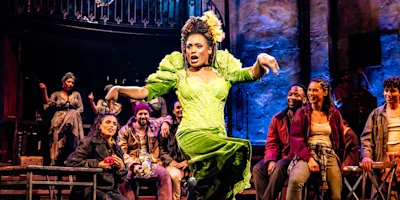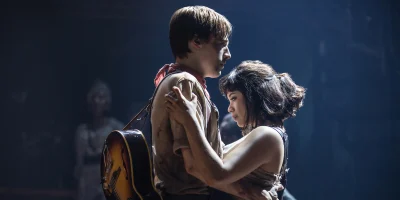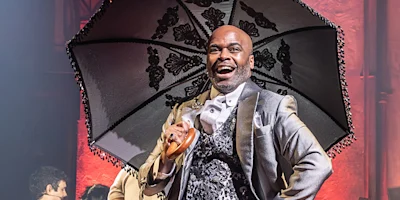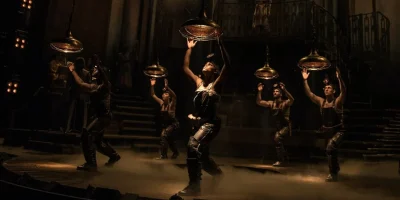
A complete guide to all the songs in 'Hadestown'
Learn more about the songs in Hadestown by singer-songwriter Anaïs Mitchell, including "Wait for Me," "Wedding Song," and "When the Chips are Down."
Hey, little songbird! Singer-songwriter Anaïs Mitchell’s sung-through ‘musical poem’ Hadestown has been through many versions since it was first performed in Barre, Vermont in 2006.
The show was first performed in London in 2018 at the National Theatre, and, in 2019, the Broadway production won eight Tony Awards, including Best New Musical and Best Score. It will come as no surprise that this richly musical folk-jazz score, led by a musician hero, is something very special.
The show intertwines two Greek myths: young lovers Orpheus and Eurydice, and mature spouses Hades and Persephone. Messenger god Hermes anchors the show, and the Fates make memorable appearances. The show is set in a post-apocalyptic setting on Earth, with strong New Orleans vibes in the hellish factory below. However, the actors in the West End production (featuring significant changes from the National Theatre version) will be using their authentic accents.
The Original Broadway Cast Recording stars Reeve Carney as Orpheus, Eva Noblezada as Eurydice, Amber Grey as Persephone, Patrick Page as Hades, and André de Shields as Hermes. If you wish to dive in to the show’s origins, you can also listen to the Live Original Cast Recording.
Once you’ve been immersed in this uniquely haunting show, you’ll never look back!
Book Hadestown tickets on London Theatre.
"Road to Hell"
We’re immediately immersed in a smoky, jazzy setting. Feather-footed messenger god Hermes explains that we’re in a world of gods and man where “On the road to hell was a railroad line.” Hermes introduces the Fates, the gods, and the human protagonists: Orpheus, the human son of a Muse, and his love, Eurydice.
“Any Way the Wind Blows”
Life is nightmarish in a post-industrial landscape where all the elements are out of kilter. Eurydice is a runaway and “no stranger to the world / no stranger to the wind.” Exposed to the elements, she’s accompanied by the Fates, “Always singing in the back of your mind.”
“Come Home with Me”
Orpheus has fallen for Eurydice but his guardian Hermes advises him not to come on too strong. He immediately proposes marriage. She’s not impressed but is intrigued when he tells her he’s working on a song that will make spring come again.
“Wedding Song”
How can Orpheus and Eurydice get married and have a happy life together when they both live in poverty? Orpheus tells her that when he finally sings his unfinished song, spring will come and they’ll have everything they need. She urges him to complete it. They sing about how they’ll be looked after by nature: the river will give them their wedding bands, the tree will make the table, and the birds the bed.
“Epic I”
Orpheus sings the song that Hermes taught him about the relationship between Hades, god of the Underworld, and Persephone, goddess of spring. When she joined him in the Underworld as his queen, spring never returned. Hades agreed to let Persephone return to earth for half the year, thereby creating the seasons. But that was long ago, and their relationship has soured.
“Livin’ it Up on Top”
Introducing Persephone, who’s been to hell and back again. She’s too late for spring but just in time for summer. The climate isn’t what it used to be but the workers take the chance to celebrate, raising a glass to their vivacious patroness who will always fill their cups.
“All I’ve Ever Known”
In a spoken introduction, Hermes explains that Orpheus has the gift of “showing you how the world could be.” Having only known a life of self-survival, Eurydice starts to truly fall in love with him: “You take me in your arms and / Suddenly there's sunlight all around me / Everything bright and war/ And shining like it never did before.” They assure each other, “The wind will never change on us / Long as we stay with each other / Then it will always be like this.” But tragedy is ahead.
“Way Down Hadestown”
Persephone is summoned back to Hadestown before the six months are up. Those who go to Hadestown don’t come back. Persephone has to self-medicate to get through the dreariness: “Give me morphine in a tin / Give me a crate of the fruit of the vine / Takes a lot of medicine / To make it through the wintertime.” Mr Hades is by all accounts a megalomaniac boss, but Eurydice is curious. It’s a lively ensemble number with bleak themes.
“A Gathering Storm”
With Persephone gone, the crops die and a storm is brewing. Eurydice’s priority is immediate survival, while Orpheus has his head in the clouds working on his song.
“Epic II”
Orpheus sings about Hades. He’s a tyrant who works his staff to the bone and hoards his wealth but Orpheus is able to feel some sympathy for him. He suggests that when Persephone is away, Hades’ “loneliness moves in him, crude and black.”
“Chant”
In Persephone’s absence, Hades has built a “neon necropolis.” He tells her that he built it because of his loneliness. The workers are miserable and it’s boiling hot when it should be the coldest time of year. On Earth, Orpheus is struggling to write and Eurydice is starving.
“Hey, Little Songbird”
Hades tries to entice Eurydice to “fly south for the winter” as his “canary.” She is tempted by the allure of comfort and security, which Orpheus is unable to provide.
“When the Chips are Down”
Eurydice is hungry and Hades has given her an opportunity. In the spoken introduction, Hermes describes Hades as a “rattlesnake” – in the original myth, Eurydice dies of a snake bite. Here, she has the agency to choose to go to the Underworld herself.
The Fates step into the spotlight. The three sisters advise her to look out for her own best interests: “Ain’t nobody but yourself to trust.”
“Gone, I’m Gone”
Eurydice’s hunger overpowers her love for Orpheus, and she leaves for Hadestown. Sensing judgment from the audience, the Fates defend her decision: “You can have your principles when you've got a belly full / But hunger has a way with you.”
“Wait for Me”
Orpheus is shocked to discover Eurydice has gone and asks Hermes for help. He insists he’d go to the end of the earth to find his love – but he hasn’t got a ticket. Hermes tells him he’ll have to go by foot – and he mustn’t look back. Meanwhile, the Fates try to waylay him. “Wait for Me” has probably become the most famous song from the show.
“Why We Build the Wall”
Hades addresses his “children” and explains why they are building a wall around Hadestown: “The enemy is poverty / And the wall keeps out the enemy / And we build the wall to keep us free.” The ensemble recites his words back to him. However, they are already enslaved, having sold their souls to Hades.
Mitchell wrote this song several years before Donald Trump’s presidency but many people have noted parallels between this song and Trump’s plans for a wall at the Mexican border.
“Our Lady of the Underground”
A tipsy Persephone kicks off Act II by inviting the workers into the speakeasy she runs secretly behind Hades’s back. She’s miserable being stuck six feet under and can empathise with the workers’ lives of grinding monotony. Getting drunk is the only way to escape: “I got the wind right here in a jar / I got the rain on tap at the bar / I got sunshine up on the shelf…”
“Way Down Hadestown” (Reprise)
Eurydice is confronted by the consequences of her choice. By signing a contract with Hades, she has become another anonymous worker on the assembly line that makes the Underworld go round. She wants to go home, but she's sold her soul. By the end of the song, she has already forgotten her name.
Flowers
“I open my mouth and nothing comes out / Nothing can awake me now,” despairs Eurydice. She remembers fields of flowers and a special person by her side. She implores him to find her.
“Come Home with Me” (reprise)
Orpheus finds Eurydice and her memory returns. He promises to take her home but she tells him that it won’t be so easy.
“Papers”
Hades tells Orpheus to leave but refuses to leave without Eurydice. Hades can’t believe his nerve and instructs the workers to beat him up.
“Nothing Changes”
Singing in close harmony, the Fates advise Orpheus not to waste his energies trying to change a rigged system. Hades is all-powerful and won’t release Eurydice from her contract.
“If it’s True”
The once-idealistic Orpheus is disillusioned and prepares to leave – but walls have ears and the workers start to empathise. They join forces to challenge Hades’s dictatorial regime: “It isn’t for the few to tell the many what is true.”
“How Long?"
Persephone sympathises with the lovers and asks Hades why he’s afraid of a boy in love. The love between Orpheus and Eurydice reminds her of the love she and Hades once shared. He has no time for such sentimentality – giving way could lead to the downfall of his kingdom.
“Chant” (Reprise)
The words to the workers’ chant has changed thanks to Orpheus’s influence (“Why do we turn away when our brother is bleeding? / Why do we build the wall and then call it freedom?”). Hades mocks Orpheus’s devotion to romantic love. He grants him the chance to sing his completed song but threatens to kill him afterwards.
Epic III
Orpheus has finally finished his song. It’s about Hades and Persephone’s relationship. He and Hades were once very similar, and experienced love in the same way: “It was like she was someone you'd always known / It was like you were holding the world when you held her.” But an excess of wealth tarnished Hades and Persephone’s relationship, making him possessive and unable to show emotion. Through Orpheus’s song, Hades and Persephone start to reconnect and dance together.
“Promises”
Orpheus and Eurydice prepare to walk home together – all that’s needed is “a steady hand to hold.” Now that Hades has softened, surely he’ll let them go?
“Word for the Wise”
Unfortunately, it isn’t that simple. The Fates tell Hades that he’ll look spineless if he gives in, but he’ll turn the pair into martyrs if he refuses. Caught between a rock and a hard place, they tell him to set them a test: “Give them the rope and they'll hang themselves.”
“His Kiss, the Riot”
Hades agrees to let the lovers leave, on one condition: Orpheus must walk in front and not look back. There’s no way he’ll be able to resist.
“Wait for Me” (Reprise)
Hermes relays the news. It’s a test, not a trick. Do they trust each other and themselves, and do they have the necessary self-discipline? Hades and Persephone say their farewells as she returns to Earth for spring. They promise to start anew in fall.
“Doubt Comes In”
It’s a long road to walk and Orpheus starts to have doubts. He asks himself, “Who am I to think that she would follow me into the cold and dark again?” Eurydice and the workers assure him that they are with him and will be until the bitter end. But Orpheus can’t resist looking back.
“Road to Hell” (Reprise)
We’re back where we started, with our narrator, Hermes. “It’s a sad song – but we sing it anyway.” Hermes explains that we keep telling this tragic story in case it has a different outcome this time.
“We Raise Our Cups”
Following the curtain call, the company, led by Eurydice and Persephone, raise a glass to Orpheus, and to all dreamers who have shown us how the world could be.
Book Hadestown tickets on London Theatre.
Photo credit: artwork for Hadestown. (Photo courtesy of production)
Frequently asked questions
What is Hadestown about?
In the warmth of summertime, songwriter Orpheus and his muse Eurydice fall in love. But these young dreamers can't survive on songs. Can they survive in the underworld? The record-breaking Tony-winning musical returns to London's West End in 2024. Find out more on Hadestown tickets.
Where is Hadestown playing?
Hadestown is playing at Lyric Theatre. The theatre is located at 29 Shaftesbury Avenue, London, W1D 7ES.
How long is Hadestown?
The running time of Hadestown is 2hr 30min. Incl. 1 interval.
What's the age requirement for Hadestown?
The recommended age for Hadestown is Ages 8+. Children aged 14 and under must be accompanied by, and sat next to, an adult aged 18 or over..
How do you book tickets for Hadestown?
Book tickets for Hadestown on London Theatre.
Originally published on










